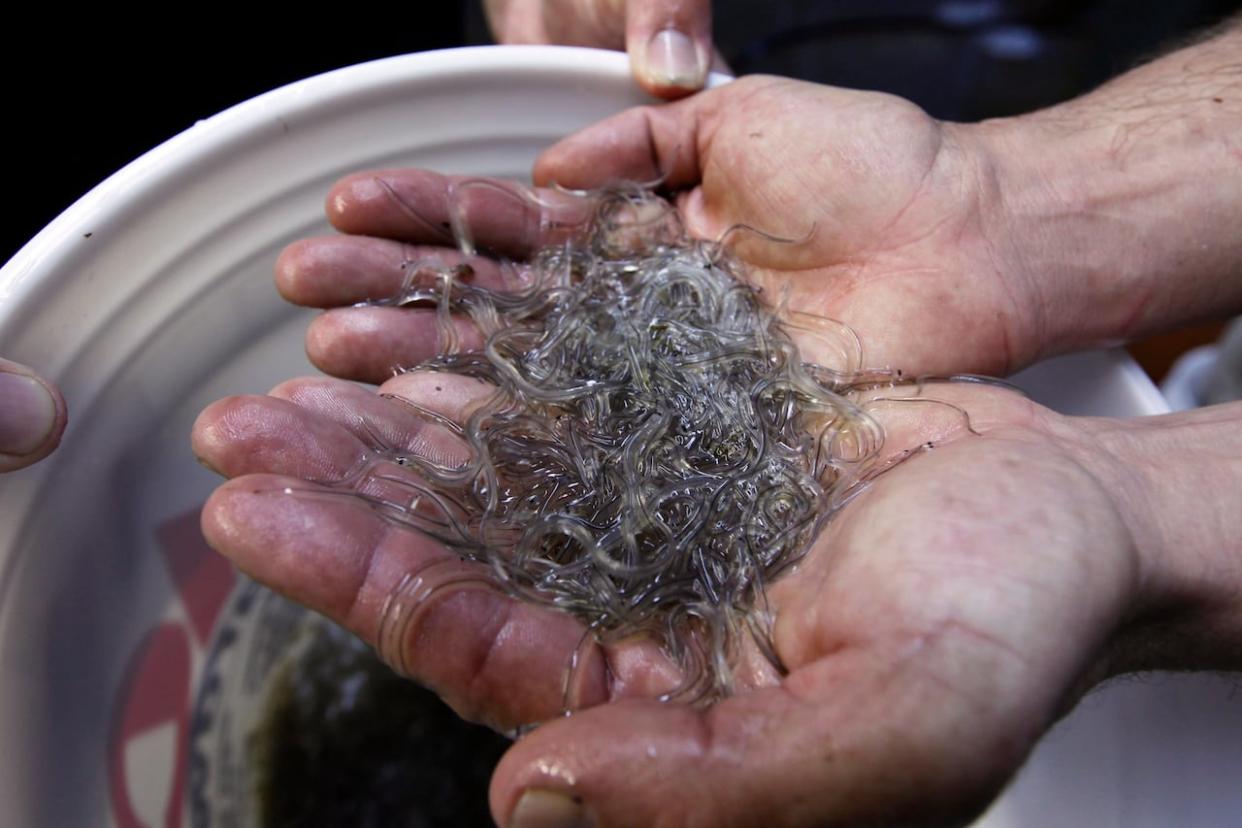Decision to cancel 2024 Maritime elver season criticized by Liberal MP, industry group

A Nova Scotia Liberal MP is objecting to the federal government's decision to cancel the 2024 season for harvesting baby eels, also known as elvers, in the Maritimes.
Three-term MP Darren Fisher wrote on Tuesday to the federal Fisheries and Oceans minister expressing his "concern and disappointment" and to question the sincerity of consultations with licensed harvesters that preceded the decision. Fisher said it amounted to checking a box.
"Otherwise, they were subject to a 10-calendar day written submission period regarding the renewal of their licenses. Ten days. No discussions," Fisher wrote in the letter, dated March 12. "It felt to my constituents, and to myself, that your decision had already been made."
The federal government has admitted it is unable to manage the lucrative — but increasingly chaotic — fishery.
In a statement on Monday, Fisheries and Oceans Minister Diane Lebouthillier cited "significant quantities of elvers being fished illegally" and "harassment, threats and violence between harvesters and toward fishery officers.
"In the light of all these considerations, it is clear that without significant changes, the risks to conservation of the species cannot be addressed and orderly management of the fishery cannot be restored," she said.
Third closures in five years
The department said it needs more time to put in regulations to crack down on the illegal harvest, mainly with improved traceability for exports.
Lebouthillier said the fishery will not reopen until "these measures are in place."
This is the third closure in five years as unauthorized harvesters cashed in on the tiny translucent eels on rivers in Nova Scotia and New Brunswick.
The elvers are netted and then shipped live to China and grown to adulthood for food. They sell for thousands of dollars a kilogram.
Last month, Lebouthillier signalled her intention to shut down the fishery this year but asked for consultations with stakeholders.
Commercial licence holders like Brian Giroux of Shelburne Elver group were informed Monday. This year, as in past years, they demanded more enforcement and argued for a delayed opening.
"We were working on a whole bunch of options for them and working with the First Nations on this issue, new entries to the fishery. And they never even listened to us when they've had nine years to do something about this and they've done nothing," Giroux said.
"This is their response when the going gets tough, you go hide. This is not an appropriate response for an agency that created this mess. I think some heads should roll here," Giroux told CBC News.
The decision to close the 2024 season was accompanied by a news release from the department announcing five people were arrested and released last week in southwest Nova Scotia for unauthorized harvest of elvers.
Warning to poachers: stay away
Fisheries and Oceans Canada said fishery officers seized two vehicles, one fyke net designed to catch elvers, eight dip nets, elver fishing equipment and approximately 1.14 kilograms of elver, which were released live back into their river where they caught.
"By not opening the fishery, our message is crystal clear: do not travel to Nova Scotia and New Brunswick to engage in elver harvesting," Lebouthillier said in her statement.
Nova Scotia's Minister of Fisheries and Aquaculture Kent Smith said DFO's handling of the fishery has been "incredibly disappointing."
"This is one example of the multiple files that we have with the DFO where we've been asking them to do a little bit more and we just haven't seen those results yet," Smith said.
"We've said from the get go that our conservation officers play a role here. We're happy to assist DFO. They're the lead on the file. We've offered support and whatever they need us to do to help, we're happy to do what we can."
The legal elver harvest is worth about $45 million a year. The authorized quota was just under 10,000 kilograms, shared between eight commercial licence holders, one communal commercial Indigenous licence and Indigenous communities in Nova Scotia and New Brunswick exercising treaty right to fish for a moderate living with Fisheries and Oceans Canada's approval.
'Look us in the eye'
An industry group that represents several commercial elver licence holders said in a statement on Tuesday that DFO's decision has made "life easier for poachers and harder for honest fishers who have built this industry from nothing and rely on the elver fishery to feed their family and support their communities.
"It is a pathetic abdication of [Lebouthillier's] most basic duty to Canadians. The sad part is that if this were the first time a minister was closing the elver fishery in the name of trying to crack down on illegal harvesters CCSEF members might be supportive — we might be optimistic," Genna Carey, president of the Canadian Committee for a Sustainable Eel Fishery, said in a statement.
"But the reality is that this is the third season in five years that has been partially or completely closed for legal fishing. Each time we see the same thing: no change in illegal harvesting, no additional enforcement by DFO and no changes for the next season."
Carey said Lebouthillier has refused to meet with people in the fishery for legitimate consultations before making her decision.
"The least she could have done was look us in the eye, the way we had to look our employees in the eye today. To abandon 1,100 law-abiding, hard-working Canadians who rely on this fishery — many of them women, many Indigenous, all playing by the rules — because it's too hard should be beyond embarrassing for any G7 government."
On Wednesday, the Assembly of Nova Scotia Mi'kmaw Chiefs also condemned the move to cancel the season.
"The Kespukwitk Mi'kmaw communities are frustrated with the decision, the lack of formal consultation and the clear disregard for Mi'kmaw rights," the assembly said in a statement.
MORE TOP STORIES

 Yahoo News
Yahoo News 
